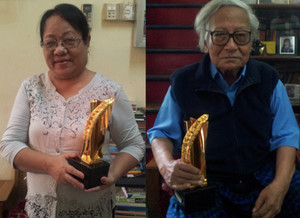Awarded in 2001 in recognition of their “outstanding services to the cause of press freedom in Burma” (Myanmar), at the time both were serving harsh prison sentences in Yangon’s notorious Insein prison in connection to their writing.
With Myanmar’s recent opening up to reform, unprecedented levels of freedom are now evident throughout society, including in the media. The World Association of Newspapers and News Publishers (WAN-IFRA) led an international press freedom mission to Myanmar ahead of the organisation’s 65th World Newspaper Congress and 20th World Editors Forum, taking place in Bangkok, Thailand 2 – 5 June, and used the occasion to finally deliver the two Golden Pen of Freedom awards on Thursday.
“20 years ago there were so many excellent, hardworking writers and committed journalists,” San San Nweh told WAN-IFRA, speaking at her home in Yangon. “That you picked me is an honour, and I am proud to receive the award on behalf of them all.”
At the age of only 15, San San Nweh became a correspondent for three national newspapers. Two years later she was the first Burmese woman to receive a complete training as a journalist. On 6 October 1994, she was arrested, together with her daughter, and found guilty of "publishing information harmful to the state" with a view to "fomenting disorder". She was sentenced to seven years in jail, the maximum provided by the emergency law, and then to a further three years for "giving biased viewpoints" to French journalists in an April 1993 interview.
After serving seven of her ten-year prison sentence, San San Nweh was released in July 2001 but was prevented from leaving the country. Her reputation as a writer is known around the world, and since 1974 she has published a dozen novels, over 500 short stories and poems.
Prominent journalist, writer and senior member of the opposition National League for Democracy (NLD), U Win Tin served nineteen of a twenty-year term in prison after being sentenced on three consecutive occasions. Held in solitary confinement for much of this time, at the age of 79 he was finally released by the military on 23 September 2008 as part of an amnesty for political prisoners ahead of 2010 elections.
As former chief editor of Hanthawathi newspaper, U Win Tin wrote many articles criticising the regime. He has been a close advisor to Nobel Peace Prize winner Aung San Suu Ky and is considered by many as her right-hand-man.
U Win Tin remains cautious about the current situation in Myanmar: “Things have certainly improved, but these so-called changes in democracy, human rights, etc., are not profound enough,” he told WAN-IFRA at his home in the Yangon suburbs. “When it comes to the ‘civilian’ government, in reality we are dealing with the same faces, and for the media building trust will take time. There is still self-censorship as we wait and see how things progress.”
Now aged 84, U Win Tin remains defiant - he still dresses in the blue prison colours of his years in detention, demanding to be absolved of the ‘crimes’ he never committed. His determination to see democracy flourish, however, resonates throughout Myanmar society: “We are embarking on a long journey to the future, but we strive, all of us, to go on.”
The Golden Pen of Freedom is WAN-IFRA's annual award recognising individuals or organisations that have made an outstanding contribution to the defence and promotion of press freedom. Established in 1961, the Golden Pen of Freedom is presented annually.
More information about the Golden Pen of Freedom can be found at http://www.wan-ifra.org/node/31099/
More information about WAN-IFRA’s press freedom activities can be found at http://www.wan-ifra.org/node/30736/




